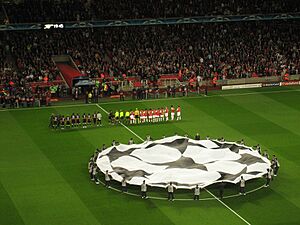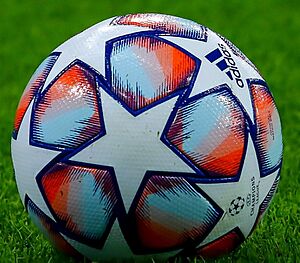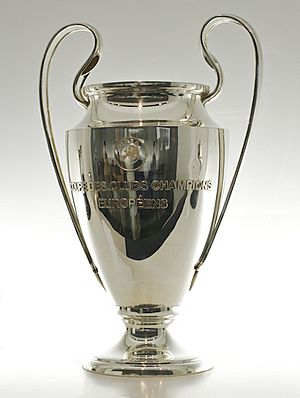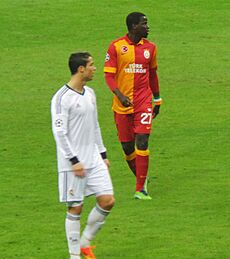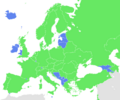UEFA Champions League facts for kids
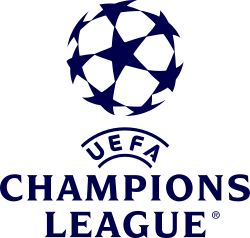 |
|
| Organising body | UEFA |
|---|---|
| Founded | 1955 (rebranded in 1992) |
| Region | Europe |
| Number of teams |
|
| Qualifier for | |
| Related competitions |
|
| Current champions | |
| Most successful club(s) | |
| Television broadcasters | List of broadcasters |
The UEFA Champions League (often called UCL) is a huge yearly football competition. It is organized by the Union of European Football Associations (UEFA). Top football clubs from all over Europe play in it.
The tournament starts with a league phase where many teams play against different opponents. After that, the best teams move on to knockout rounds. In these rounds, teams play two matches against each other, one at home and one away. The team that scores more goals in total wins and moves forward. The very last match is a single final game.
The Champions League is the most-watched club football competition in the world. It is also one of the most important football tournaments overall. Only the FIFA World Cup and the UEFA European Championship are watched by more people. It is a very special competition for European clubs.
The competition began in 1955. Back then, it was called the European Champion Clubs' Cup, or just the European Cup. Only the champions of each country's league could enter. In 1992, it changed its name to the UEFA Champions League. It also started allowing more than one team from some countries to join.
Today, the Champions League starts in early July with qualifying rounds. Teams play two matches in each round. The teams that win these matches join 29 other teams that automatically qualify. These 36 teams then play in the league phase. Each team plays eight matches, four at home and four away. The top 24 teams from this phase go into the knockout rounds. The final match is usually played in late May or early June. The team that wins the Champions League gets to play in next year's Champions League. They also play in the UEFA Super Cup, the FIFA Intercontinental Cup, and the FIFA Club World Cup.
Clubs from Spain have won the most titles (20 wins). England is next with 15 wins, then Italy (12 wins), Germany (8 wins), Netherlands (6 wins), and Portugal (4 wins). Six different English clubs have won the title, which is the most for any country. In total, 24 different clubs have won the competition. 13 of these clubs have won it more than once.
Real Madrid from Spain is the most successful club. They have won the tournament 15 times. They are also the only club to win it five times in a row, right at the beginning of the competition. Only one club has won all their matches in a single tournament: Bayern Munich in the 2019–20 season. Paris Saint-Germain are the current champions. They beat Inter Milan 5–0 in the 2025 final to win their first ever title.
Contents
History of the Champions League
Football clubs from different European countries first played against each other a long time ago. In 1895, the champions of England and Scotland played a match. Later, in 1900, champions from Belgium, Netherlands, and Switzerland played in a "club championship of the continent."
After World War II, a French sports editor named Gabriel Hanot had an idea. He wanted to create a competition for the best clubs across Europe. He was inspired by a successful tournament in South America. In 1955, his idea became real, and the European Champion Clubs' Cup was born in Paris.
The Early Years (1955–1967)
The first European Cup started in the 1955–56 season. Sixteen teams from different countries were invited to play. The very first match was on September 4, 1955, between Sporting CP and Partizan, ending in a 3–3 draw. The first goal was scored by João Baptista Martins.
The first final was on June 13, 1956, between Stade de Reims and Real Madrid. Real Madrid won 4–3. Real Madrid then won the trophy for five years in a row, from 1956 to 1960. This amazing record still stands today. Alfredo Di Stéfano was a key player for Real Madrid during this time.
After Real Madrid's winning streak, other teams started to win. Benfica from Portugal won in 1961 and 1962. Then, AC Milan from Italy won in 1963. Inter Milan won in 1964 and 1965. In 1967, Celtic from Scotland became the first British club to win the European Cup. Their players were all from near Glasgow and were known as the "Lisbon Lions".
The 1970s and 1980s
In the 1967–68 season, Manchester United became the first English team to win the European Cup. They beat Benfica 4–1 in the final. Dutch teams like Feyenoord (1970) and Ajax (1971, 1972, 1973) then showed their strength. Ajax, led by the famous player Johan Cruyff, won three times in a row.
After Ajax, Bayern Munich from West Germany also won three times in a row, from 1974 to 1976. This period saw clubs from the Netherlands and West Germany dominate the competition.
English clubs then had a strong period, winning seven titles between 1977 and 1984. Liverpool won in 1977, 1978, 1981, and 1984. Nottingham Forest won in 1979 and 1980, and Aston Villa won in 1982.
In 1985, a sad event called the Heysel Stadium disaster happened at the final. Because of this, all English clubs were banned from playing in European competitions for five years. Liverpool was banned for six years. After the ban, teams like Steaua București (Romania), Porto (Portugal), and PSV Eindhoven (Netherlands) won the trophy.
The Champions League Era (1992–Present)
In 1992, the competition changed its name to the UEFA Champions League. It also changed its format to include a group stage before the knockout rounds. The 1996-97 season was the last time only league champions could compete. Borussia Dortmund won that year.
After 1997, more teams from the top leagues were allowed to enter. This led to Spanish clubs, especially Real Madrid and Barcelona, dominating the competition. Real Madrid won three times in a row from 2016 to 2018. English clubs also had strong periods, winning many titles between 2005–12 and again from 2018-23.
During the 2020 COVID-19 pandemic, the tournament was paused. When it restarted, the quarter-finals and semi-finals were played as single matches in Lisbon, Portugal, instead of two-legged ties.
The Champions League Anthem
The UEFA Champions League has its own special song, simply called "Champions League." Tony Britten wrote it in 1992. It is based on a piece of music by George Frideric Handel from 1727. The song is played by the Royal Philharmonic Orchestra and sung by the Academy of St. Martin in the Fields. Many people say the anthem is almost as famous as the trophy itself!
The song's chorus uses three languages: English, German, and French. The most exciting part says: 'Die Meister! Die Besten! Les Grandes Équipes! The Champions!' This means "The Masters! The Best! The Great Teams! The Champions!" You hear the anthem before every Champions League game as the teams stand on the field. It is also played at the start and end of TV broadcasts. The full anthem is about three minutes long.
Sometimes, special singers perform the anthem live at the Champions League final. They might sing parts of it in the language of the country hosting the final. Famous singers like Andrea Bocelli and Juan Diego Flores have performed it.
Champions League Branding
In 1991, UEFA wanted to create a strong brand for the Champions League. They worked with a company called TEAM. Together, they created the anthem, chose black and white (or silver) as the main colors, and designed the "starball" logo. The starball logo was designed by Design Bridge, a company in London.
TEAM makes sure that the colors and starball logo look the same at every match. This means that whether you are watching in Moscow or Milan, you will see the same stadium decorations and the same "starball" ceremony in the middle of the field. You will also hear the same Champions League anthem. By 1999, 94% of fans recognized the starball logo.
How Teams Qualify and Play
Getting into the Champions League
The UEFA Champions League used to have a group stage with 32 teams. Now, it has changed to a league phase with 36 teams. Teams get into the tournament in two main ways. Some teams get in directly because they are champions of their national league or finished very high up. Other teams have to play in qualifying rounds to earn their spot.
The number of teams each country can send to the Champions League depends on their UEFA coefficient. This is a score based on how well clubs from that country have done in European competitions over the past five years. Countries with higher scores can send more teams, and those teams might not have to play as many qualifying rounds.
Teams must also have a license from their national football association. To get this license, clubs need to meet certain rules about their stadium, facilities, and money.
The New League and Knockout Phases
Starting with the 2024–25 season, the Champions League has a new format. Instead of groups, all 36 teams are in one big league table. Each team plays eight matches against eight different opponents. Four of these matches are at home, and four are away. Teams are put into different "pots" for the draw based on their strength. They play two teams from each pot. The league phase runs from September to January.
After the league phase, the top eight teams get a direct pass to the Round of 16. Teams ranked 9th to 24th play in a special knockout play-off round. These play-offs are two-legged, meaning two matches. The eight winners from these play-offs join the top eight teams in the Round of 16. Teams that finish 25th to 36th in the league phase, and the losers of the play-offs, are out of the competition.
After the Round of 16, the competition continues with quarter-finals and semi-finals. These are also two-legged matches. The final is a single match played at a special venue chosen before the season starts. The final is usually held in late May or early June.
Prizes and Money
The Trophy and Medals
Every year, the winning team receives the European Champion Clubs' Cup. The current trophy has been used since 1967. It is 74 centimeters (about 29 inches) tall and made of silver. It weighs 11 kilograms (about 24 pounds). It was designed by Jürg Stadelmann, a jeweler from Switzerland.
Before 2008, if a team won the Champions League three times in a row or five times overall, they got to keep the actual trophy forever. Because of this, a new trophy had to be made each time. Five clubs have a version of the official trophy: Real Madrid, Ajax, Bayern Munich, Milan, and Liverpool. Since 2008, UEFA keeps the main trophy, and winning clubs receive a copy.
The Champions League winners also get 40 gold medals. The runners-up get 40 silver medals.
Prize Money
Clubs earn a lot of money from playing in the Champions League. This money comes from TV rights and other sources. For the 2024–25 season, here is how some of the prize money is given out:
- Teams in the play-off round get €4.29 million.
- Teams in the league phase get a base fee of €18.62 million.
- Winning a match in the league phase earns €2.1 million.
- A draw in the league phase earns €700,000.
- Finishing in the top 8 of the league phase earns an extra €2 million.
- Reaching the Round of 16 earns €11 million.
- Reaching the Quarter-finals earns €12.5 million.
- Reaching the Semi-finals earns €15 million.
- The runners-up in the final get €18.5 million.
- The Champions League winners get €25 million.
In the 2019–20 season, Paris Saint-Germain, who were runners-up, earned almost €126.8 million in total. Bayern Munich, who won that year, earned €125.46 million.
Sponsors of the Champions League
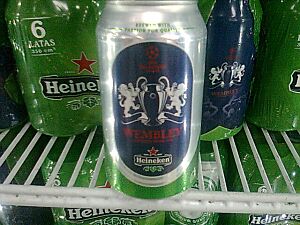
The UEFA Champions League has many big international companies as sponsors. When the Champions League started in 1992, it was decided that up to eight companies could sponsor the event. Each sponsor gets advertising boards around the field, their logo shown during interviews, and tickets to matches. This helps the sponsors get a lot of attention.
Sometimes, clubs cannot wear jerseys with certain sponsor logos if those types of advertisements are not allowed in the country where they are playing. For example, if a country bans alcohol advertising, a team with an alcohol sponsor on their shirt would have to remove that logo for the match.
Watching the Champions League
Many people around the world watch the Champions League on TV. It is very popular in Europe and beyond. The final match of the tournament is often the most-watched yearly sports event in the world. The final in 2013 had about 360 million TV viewers, which is the highest number so far for the competition.
Player Records
Most Wins
- Francisco Gento (6 wins) - Real Madrid
- Dani Carvajal (6 wins) - Real Madrid
- Luka Modrić (6 wins) - Real Madrid
- Nacho Fernández (6 wins) - Real Madrid
- Toni Kroos (6 wins) - Real Madrid
- Cristiano Ronaldo (5 wins) - Manchester United, Real Madrid
- Paolo Maldini (5 wins) - AC Milan
- Alessandro Costacurta (5 wins) - AC Milan
- Alfredo Di Stéfano (5 wins) - Real Madrid
- José María Zárraga (5 wins) - Real Madrid
- Marquitos (5 wins) - Real Madrid
- Héctor Rial (5 wins) - Real Madrid
- Juan Santisteban (5 wins) - Real Madrid
- Gareth Bale (5 wins) - Real Madrid
- Karim Benzema (5 wins) - Real Madrid
- Casemiro (5 wins) - Real Madrid
- Isco (5 wins) - Real Madrid
- Marcelo (5 wins) - Real Madrid
- Keylor Navas (5 wins) - Real Madrid
- Sergio Ramos (5 wins) - Real Madrid
- Raphaël Varane (5 wins) - Real Madrid
Most Appearances
- Cristiano Ronaldo (183 appearances)
- Iker Casillas (177 appearances)
- Lionel Messi (163 appearances)
- Karim Benzema (152 appearances)
- Toni Kroos (151 appearances)
- Xavi (151 appearances)
- Thomas Müller (150 appearances)
- Sergio Ramos (142 appearances)
- Ryan Giggs (141 appearances)
- Raúl (142 appearances)
Most Goals
- Cristiano Ronaldo (140 goals)
- Lionel Messi (129 goals)
- Robert Lewandowski (94 goals)
- Karim Benzema (90 goals)
- Raúl (71 goals)
- Ruud van Nistelrooy (56 goals)
- Thomas Müller (54 goals)
- Thierry Henry (50 goals)
- Alfredo Di Stéfano (49 goals)
- Zlatan Ibrahimović (49 goals)
Most Assists
- Cristiano Ronaldo (42 assists)
- Ángel Di María (41 assists)
- Lionel Messi (40 assists)
- Neymar (33 assists)
- Ryan Giggs (31 assists)
Awards
Player of the Season
Since the 2021–22 season, UEFA gives out the UEFA Champions League Player of the Season award. A group of coaches from the clubs in the competition and 55 journalists choose the winner.
- 2021–22: Karim Benzema (Real Madrid)
- 2022–23: Rodri (Manchester City)
- 2023–24: Vinícius Júnior (Real Madrid)
- 2024–25: Ousmane Dembélé (Paris Saint-Germain)
Young Player of the Season
UEFA also started giving out the UEFA Champions League Young Player of the Season award in the same season.
- 2021–22: Vinícius Júnior (Real Madrid)
- 2022–23: Khvicha Kvaratskhelia (Napoli)
- 2023–24: Jude Bellingham (Real Madrid)
- 2024–25: Désiré Doué (Paris Saint-Germain)
Images for kids
-
Alfredo Di Stéfano (pictured in 1959) led Real Madrid to five consecutive European Cup titles between 1956 and 1960.
-
Johan Cruyff (pictured in 1972) won the European Cup three times in a row with Ajax.
See also
 In Spanish: Liga de Campeones de la UEFA para niños
In Spanish: Liga de Campeones de la UEFA para niños
- Continental football championships
- List of association football competitions
 | William Lucy |
 | Charles Hayes |
 | Cleveland Robinson |


